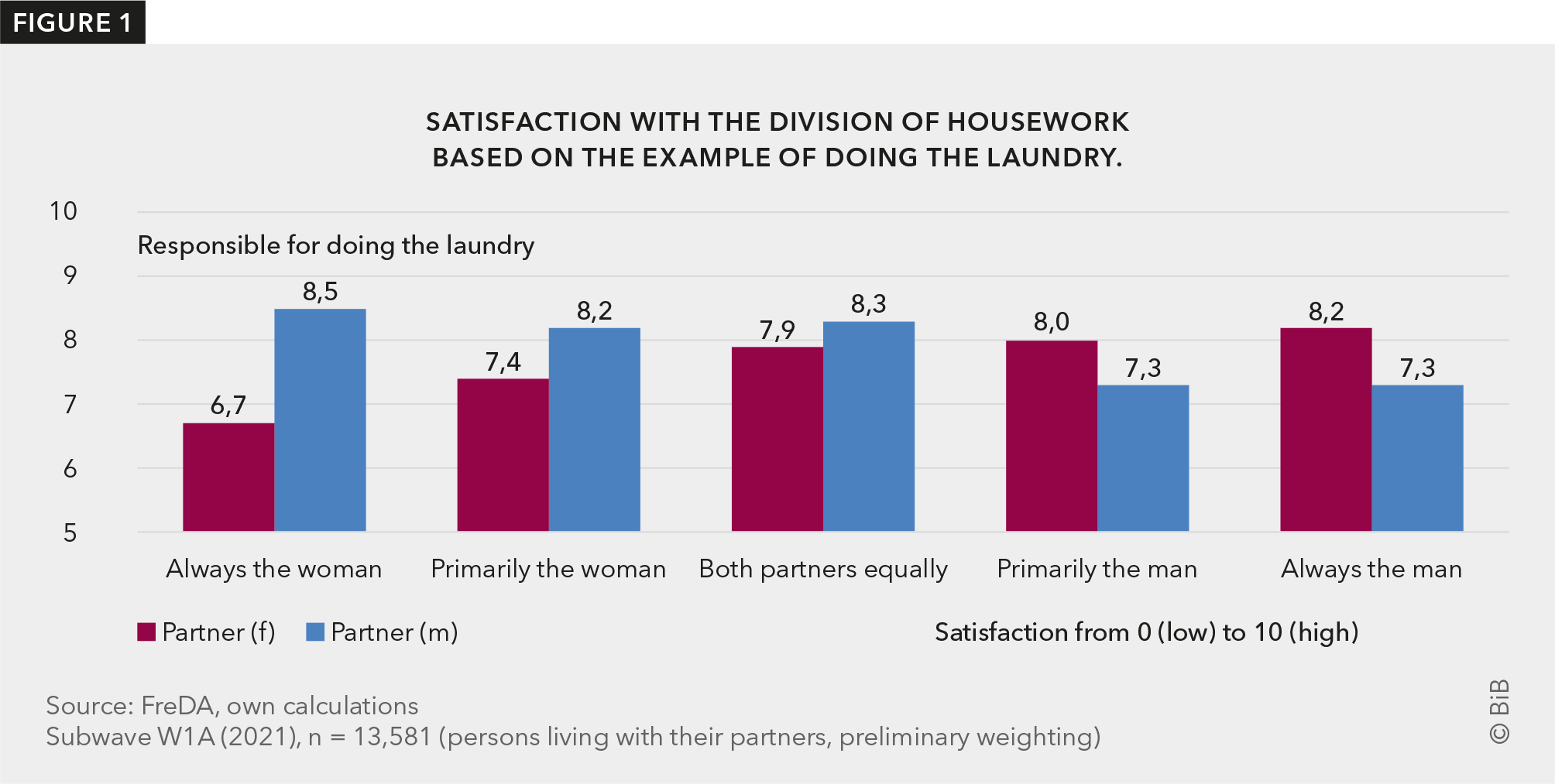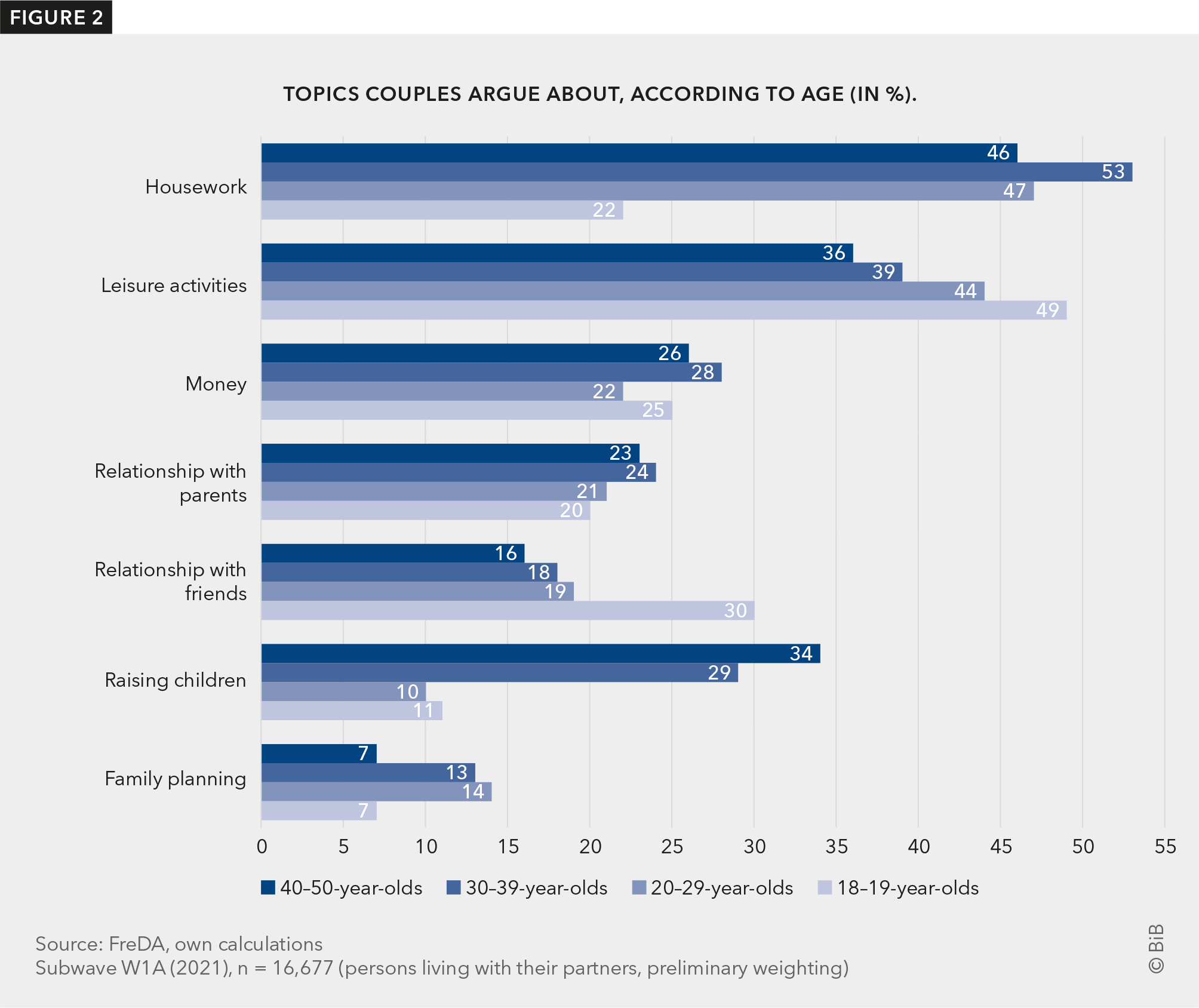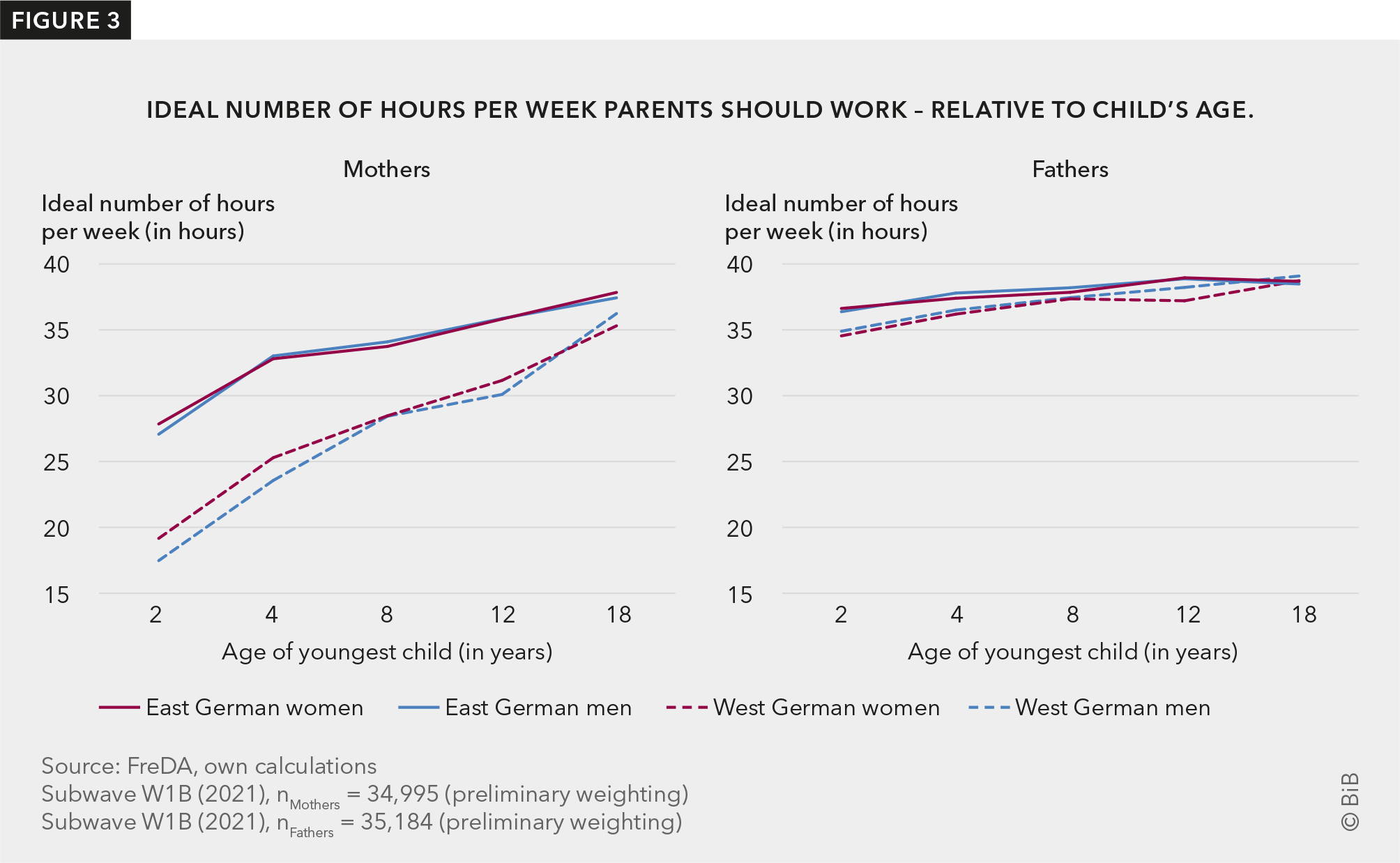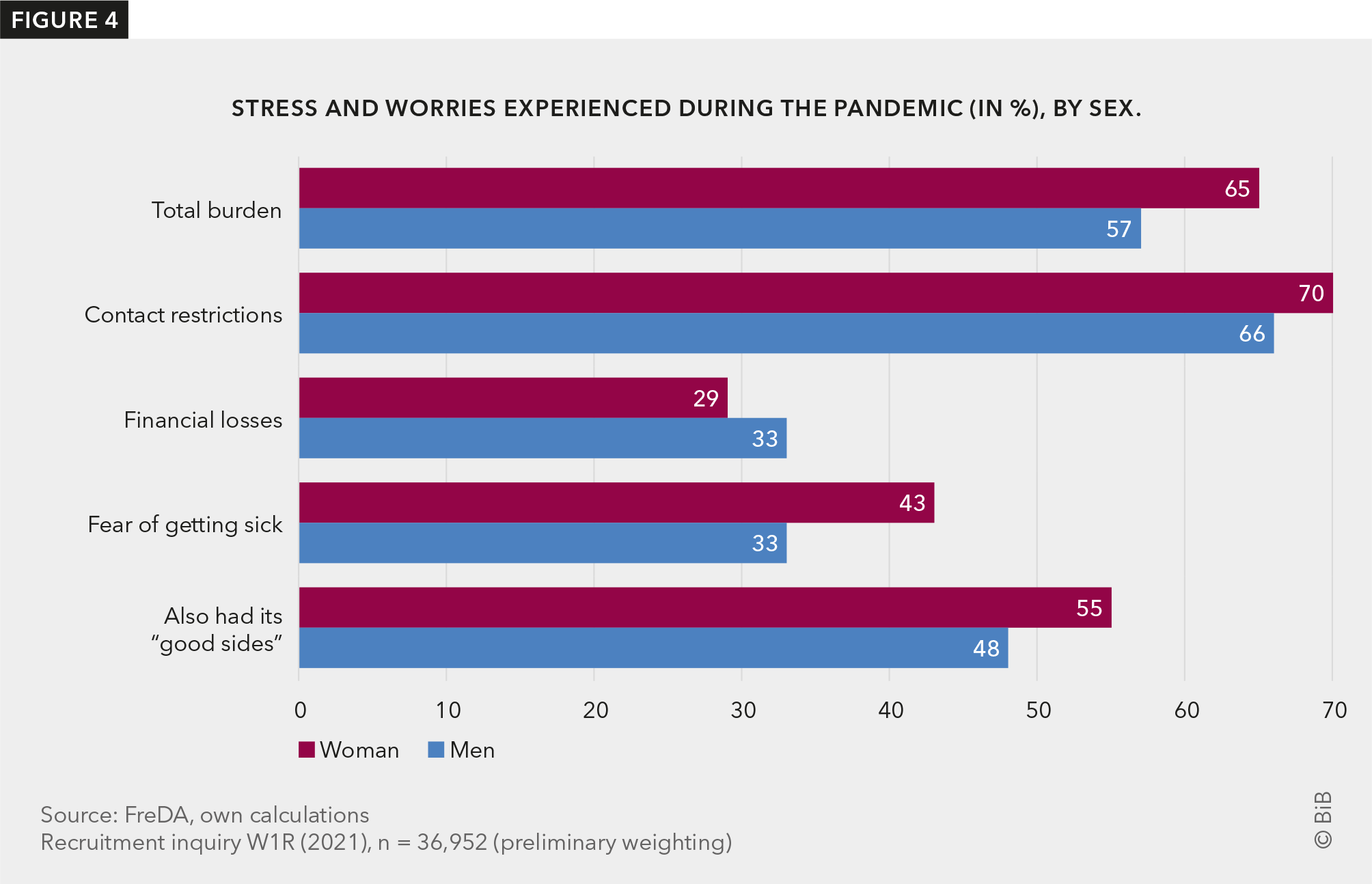Gender roles, housework, couple conflicts. A first look at FReDA – The German Family Demography Panel Study
- Article
- Bibliography information
- Authors
- Complete issue
FReDA1 stands for “Family Research and Demographic Analysis” (Schneider et al., 2021). The project is a collaboration between the Bundesinstitut für Bevölkerungsforschung (BiB; Federal Institute for Population Research) in Wiesbaden, the GESIS – Leibniz-Institut für Sozialwissenschaften (Leibniz Institute for the Social Sciences) in Mannheim and the University of Cologne, which represents the consortium of the “pairfam” panel study. It was launched on 1 January 2020. The development and consolidation phase is funded through 2024 by the Bundesministerium für Bildung und Forschung (BMBF; Federal Ministry of Education and Research).2 In the event of a positive evaluation, the Bundesministerium des Innern und für Heimat (BMI; Federal Ministry of the Interior and for Homeland Affairs) intends to continue the project beginning in 2025.
The data collected in FReDA cover a wide range of topics concerning family and private relationships, including family planning and fertility, partnerships, parenthood, intergenerational relationships, attitudes and values, health, well-being and personality, education, employment situation, income and wealth.
A representative sample formed the basis for the FReDA surveys in 2020. The basic pool for this was the German resident population aged 18 to 49. It was conducted in the spring of 2021. Respondents were asked to independently complete a questionnaire provided for them online. This was possible despite the prevailing contact restrictions because of the COVID-19 pandemic (Gummer et al., 2020). Those unwilling or unable to do so (around 15 % to 20 % of respondents) were also offered the questionnaire in paper form. A FReDA survey takes about 25 minutes. Each wave is divided into two “subwaves”, surveyed in early summer (Subwave A) and late autumn (Subwave B) of each year. This reduces the time burden on respondents in each partial wave. A 10-minute recruitment survey Wave 1R was conducted in the spring of 2021 to facilitate access to the panel; 37,417 people took part in this recruitment survey, 26,725 of whom consented to be contacted for further surveys. Participation in the subsequent surveys in 2021 was 22,485 (Wave 1A) and 20,270 people (Wave 1B). If respondents had a partner, they too were asked to be interviewed. By the summer of 2021, about half of them, 7,342 people, had participated in the survey.
FReDA integrates and continues two previous studies. The first is the Generations and Gender Survey (GGS), a renowned international survey programme in which the BiB was involved from the outset. The second study is the Relationship and Family Panel (pairfam), established in 2008.
The data from the recruitment survey Wave 1R (Bujard et al., 2022) have been available to the scientific community since 31 May 2022 (bit.ly/FReDA_Datenzugang). The further subwaves Wave 1A and Wave 1B, surveyed in 2021, have also been available since 31 May 2023. The findings presented here are based on a beta version of this data, made available in the winter of 2022/2023, i.e., marginal changes in percentages may still be forthcoming, but not in the fundamental relationships described here.
Relationship life and gender roles in Germany
The core topics of FReDA include relationship life and gender roles. The following analyses shed light on these: They look at satisfaction with the division of labour in the household and at frequent issues in relationship arguments. They highlight gender roles in mothers’ and fathers’ perceptions of ideal working hours and in gender-specific concerns that emerged during the coronavirus pandemic.
A central issue in partnerships is the division of the most important and time-consuming shared responsibilities: on the one hand, gainful employment and, on the other hand, housework and caretaking, usually the care and upbringing of children or the care of family members. The responsibility for housework in a couple’s household, traditionally attributed to women, is today shared more equally between the partners than it was in the 1960s. However, even today, the FReDA data show, in many relationships, the cleaning, cooking and laundry duties are still being carried out primarily by the woman.
Figure 1 shows how such unequal distribution leads to dissatisfaction for the more involved person. Respondents who state that they “always” or “primarily” assume a household task also generally express less satisfaction with the division of housework. For example, women who always do the laundry in their relationship rate their satisfaction with the division of housework on a scale of 0 to 10 at around 6.7 on average, a comparatively low value. This also applies very similarly to men who do the laundry alone – even if this occurs much less frequently than among women. We register similar results for other household tasks such as cooking and cleaning. Whether the household chores are shared equally or whether one partner does more hardly makes any difference to satisfaction: A high level of satisfaction for both partners is achieved only when “both equally” shoulder the housework.
As can be surmised from the findings on (dis)satisfaction with the division of housework, this is also a frequent topic of conflict in partnerships (see Figure 2). When asked how often they argue with their partner about various topics, housework crops up particularly often. However, the allocation of tasks is not always the subject of the dispute; it may also centre around how things are done, for example. The second most frequently mentioned conflict topic is leisure activities.
Certain conflict topics tend to gain and lose relevance during a couple’s lives because they only play a role in their everyday lives during certain phases. Figure 2 illustrates this according to the age of the interviewee. Thus, the topic of family planning gains in importance between 20 and 30 and subsides after 40, when family planning is complete for most couples. Couples argue about raising children when minors are present, typically after the age of 30.
There is still a clear imbalance regarding paid work. But, as other studies have shown, this occurs only when a couple already has children, and the question arises as to which parent will reduce their paid work and to what extent. Typically, mothers then switch to part-time work and do so for a longer period of time, while fathers continue to work full-time.
But what level of employment would 18-to 50-year-old parents in Germany prefer? Common survey questions often suggest that the attitudes among young adults are already very egalitarian. However, one question regarding parents’ ideal weekly working hours, recorded for the first time in FReDA, reveals existing gender differences in attitudes towards parental employment. Because caretaking demands substantial time to be spent in the “rush hour phase of life” – where children are under the age of 6 – the question is posed to fictitious parents whose youngest child varies from 2 to 18.
Figure 3 shows that mothers with young children favour a significant reduction in working hours, with the desired amount of time spent working increasing again significantly as the child gets older. In Western Germany, this is 18 hours per week for a mother of a 2-year-old and over 35 hours per week for an 18-year-old – significantly higher than is actually the case. According to the average respondent, the fathers of small children should also reduce their working hours, albeit only very slightly.
While women and men agree on the ideal working hours of mothers and fathers, well-known differences remain in attitudes between respondents from East and West Germany. In East Germany, the ideal working hours for mothers of 2-year-old children are 27 hours, on average, around 8 hours more than in West Germany. As the child’s age increases, these values converge in East and West Germany.
The persistent gender differences are reflected even in the different types of stress and worries experienced by men and women during the coronavirus pandemic (Figure 4). In the spring of 2021, the main factor was the stress caused by contact restrictions, in addition to fears of falling ill and financial worries. Most younger people had not yet been vaccinated against the coronavirus at the time, and extensive contact restrictions were still in force.
Overall, women experienced greater stress than men. They were also much more likely to be afraid of falling ill and suffered more from the contact restrictions. This most likely reflects the additional responsibilities of caring for and teaching children at home because daycare centres and schools were closed. Only concerns about financial losses were greater among men than women. Significantly more women than men could see the “good sides” to the pandemic.
Conclusion
From finding a partner to separation, the FReDA data shed light on various aspects of relationship life, only excerpts of which we can show here. The question of how couples organise their everyday lives and how they manage the balancing act of doing housework, bringing up children and working remains a central concern. As a result, dissatisfaction and conflicts are often linked to this. Over the past few decades, there has been a growing trend towards sharing tasks in a partnership more equally between the two partners. However, there is still often a gap between desire and reality.
Footnote
1This article was published in 2023 in the journal Bevölkerungsforschung Aktuell of the Bundesinstitut für Bevölkerungsforschung (BiB; Federal Institute for Population Re-search): Lück, Detlev, Frembs, Lena C., Bujard, Martin, & Weih, Ulrich (2023). Geschlechterrollen, Hausarbeit, Paarkonflikte. Ein erster Blick in “FReDA – Das familiendemografische Panel”. Bevölkerungsforschung Aktuell 1/2023: 3-8. We republish it here with the kind permission of the BiB.
2 Funding reference 01UW2001A.
Citation
Lück, D., Frembs, L. C., Bujard, M., & Weih, U. (2023). Gender roles, housework, couple conflicts. A first look at FReDA – The German Family Demography Panel Study, FORUM sexuality education and family planning: information service of the Federal Centre for Health Education (BZgA), 1, 4–9.
Publication date
Detlev Lück, Lena Frembs, Martin Bujard and Ulrich Weih are BiB employees and part of the project team responsible for the FReDA study.
Contact: detlev.lueck(at)bib.bund.de
All links and author details refer to the publication date of the respective print edition and are not updated.
Issuing institution
In issue
- Gender roles, housework, couple conflicts. A first look at FReDA – The German Family Demography Panel Study
- Parents' views on their children's sexuality education. Results of the BZgA study on Youth Sexuality
- Unwanted pregnancies over the life course – Results of the “women´s lives 3” study
- A comparison of reproduction policy across countries: A new international database
- Pioneering change: ANSER's impact linking research and policy on sexual and reproductive health
- Online pregnancy termination videos: Providers, messages and audience reactions
- KisS: A programme to prevent sexual aggression in young adults
- Sexualised violence in adolescence – A comparison of three representative studies
- “How are you doing?” The psychosocial health and well-being of LGBTIQ* people
- Experiences with §219 pregnancy advice by phone or video. Client perspectives
- The relevance of sexual rights in family and schoolbased sexuality education in Switzerland
- School sexuality education from the perspective of the target group
- Impediments to accessing contraception in asylum centres: The perspectives of refugee women in Switzerland
- The EMSA study: Sexual debut, menstruation and pregnancy termination on social media
- Sexuality education in primary school: A survey of teachers using a mixed-methods design
- The EU project PERCH: A united fight against HPV-related cancer
- The Erasmus+ project: Sexuality education for adolescents and young adults with a refugee background
- Safe Clubs: A transfer project for the prevention of sexualised violence in sport
- Incurably queer? An approach to research on conversion therapies in Germany
- The LeSuBiA study: Life situation, safety and stress in everyday life





